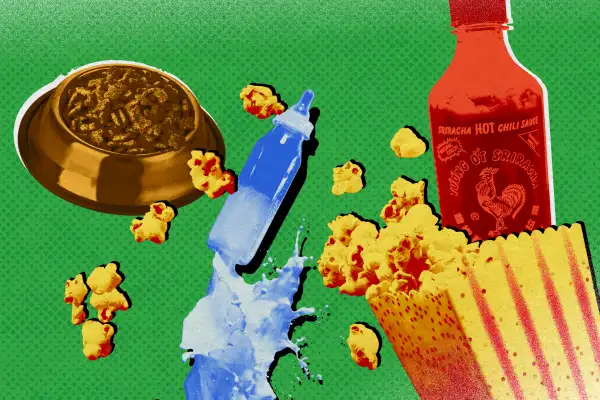8 New Shortages Shoppers Are Facing This Summer, From Popcorn to Pet Food

If you think pandemic-era shortages are fading away, think again.
An ongoing shortage of baby formula due to a wide-ranging manufacturer recall has been causing hardships for families in recent months. Production recently resumed at a previously-closed plant, but meanwhile the crisis is still persisting.
It’s not just baby formula. While many of the shortages from the pandemic's early days have abated and hand sanitizer and toilet paper are now plentiful, consumers are still struggling to find certain goods because of ongoing supply chain snags, production delays and even extreme weather.
Here are eight things that are hard to find or extra expensive right now because of supply problems, from movie theater popcorn to tampons.
Sriracha hot sauce
In a letter to wholesale customers last month, sriracha maker Huy Fong Foods said that weather conditions are causing a severe shortage of the chili peppers it uses to make the beloved spicy condiment.
“Unfortunately, this is out of our control,” the company wrote. “Without this essential ingredient we are unable to produce any of our products.” It's unclear when store inventory will be affected by the pepper shortage.
Popcorn
As moviegoers return to the box office this summer, they may encounter a popcorn shortage — or at least higher prices.
Farmers are growing less popcorn in general because other crops can yield higher profits at lower costs, the Wall Street Journal reported last month. An ongoing shortage of truckers is delaying shipments too.
And it’s not just the snack itself that's difficult to source. Movie theater concession manufacturers are also facing shortages of cups, trays and the plastic liners for popcorn bags, according to the Journal.
Tampons
Retailers have been struggling to keep tampons on the shelves, according to a recent report from TIME, leaving people across the country struggling to access the essential care products.
In a recent earnings call, Andre Schulten, Chief Financial Officer at Tampax maker Procter & Gamble, cited difficulties sourcing raw materials and described the “costly and highly volatile” process of transporting its goods, including feminine care products. The company will raise prices in July to cope with the extra expenses.
Pet food
The same supply chain issues affecting the grocery and personal care categories are also slowing down shipments of pet food this summer, and a shortage of aluminum cans is only making things worse. Citing “inconsistent availability and ongoing sourcing issues,” the Trader Joe’s grocery chain announced in April that it would discontinue six pet food products.
It’s hard to predict when things will return to normal. “Food brands are promising they are going to get better in the next four and six months; others are saying it might be up to a year before we see some of their products back in stock,” one Minnesota pet store general manager told local station KSTP this week.
Baby formula
Back in February, Abbott Nutrition initiated a voluntary recall of certain powdered formulas under the Similac, Alimentum and EleCare brands after complaints of possible bacterial contamination.
The company said that none of its products tested positive for the bacteria, but the disruption stemming from the recall and subsequent shutdown of a plant in Michigan means that families are still struggling to find formula on store shelves and online.
Contrast dye
Shortages also persist outside the grocery store. A contrast dye that is essential for medical imaging tests like CT scans is being rationed in hospitals and causing delays for patients, CNN reported this week. Coronavirus-related lockdowns in Shanghai, where the dye is manufactured by GE, are being blamed for the shortage.
Rental cars
If you’re in the market for a rental car for your upcoming summer vacation, or even looking to buy a new car yourself, it’s a good idea to start your search early and prepare to spend extra.
An enormous drop in traveler demand in the early days of the pandemic prompted rental car companies to sell portions of their fleets, and they've struggled mightily to replenish their supply of cars. Production in the car manufacturing industry has slowed significantly because of an ongoing shortage of semiconductor chips.
For rental car companies, that means low inventory and high prices across the board. Bloomberg found that daily rental car rates in the U.S. this summer are roughly double what they were in the summer of 2019.
“It’s still tough out there,” Greg Scott, spokesman for the American Car Rental Association, told the Washington Post in March. “There are some instances where the supply of new cars has improved, but it’s not back where it needs to be and it won’t be for a long time.”
Houses
News about the red-hot housing market is inescapable, and home prices are up an eye-watering 20% in the last year alone. Those rising prices are attributable in large part to a severe shortage of housing inventory that has persisted throughout the pandemic. There were 48.5% fewer active listings last month compared to May 2020, according to recent data from Realtor.com.
Shipping delays and shortages of lumber and other raw materials helped drive up costs for homebuilders and slowed down the pace of construction — just as demand for new homes began to boom as people sought out more space during the pandemic. Thankfully, there are signs that construction is picking back up again. But for now, buyers can expect slim pickings and exorbitantly high prices.
More from Money:
5 Facts That Show How Painful Gas Prices Are Now
Here's How Inflation Is Actually Affecting the Stock Market
How Rising Mortgage Rates Explain the Extreme Shortage of Homes for Sale
